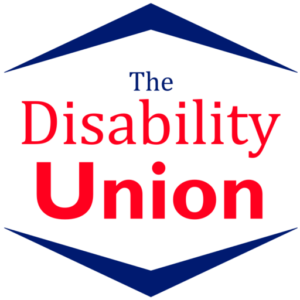OUR vision The DISABILITY union
As disabled people, we know how often our interests overlap with each other’s, and how the same challenges affect many of us. Alone we may feel helpless and ignored, but together, we can uplift the entire disability community

OUR VALUES
Community, Opportunity, Unity
Our ambition at The Disability Union is to build a truly inclusive world. We believe that inclusion is a human right, which is why we work day in, day out to protect and enhance the lives of disabled people across the United Kingdom through community, opportunity and unity.
We know how difficult it can be to live in a world that isn’t built for you. Whether it be workplace discrimination, the complexity of applying for benefits or heightened living costs, society finds endless ways to force adversity onto disabled people. That is why we exist, and it is why we are always looking to offer our members everything they need to live independent lives.
The Disability Union isn’t like the Disabled Peoples’ Organisations and charities that you’ve heard of. Our union is funded primarily by our members, ensuring that no matter what, our voice remains independent, and our performance is assessed entirely by measure of our members’ satisfaction. We pride ourselves on our independent voice, which allows us to give the most honest advice and provide the best service to our members.
Every member has a say in what our goals and priorities are and we pursue these through a combination of education, political activism and community organising.

THE STRATEGY
Achieving a truly accessible society with nothing about us without us.
We believe that disabled people have no salvation beyond their own power. We are a minority in a society that treats us as second-class citizens. We can only change this if we fight together.

Our Policies
Find out where The Disability Union stands on a range of issues. These policies are formulated from consultation with our members.
Can’t find what you are looking for? Contact us
Benefits and social security
The benefit system in the UK is woefully unequiped to support disabled people. Rather than granting us the independence we are entitled to, it entraps us in an abusive and dysfunctional system by design.
We should not be beholden to means testing and hostile assessments in order to qualify for benefits.
Makes it more expensive – unsustainable
People with lifelong conditions (e.g. autistic people) should not be reassessed
Should not be penalised for earning money
Dignity
Couples/partners
Not enough money
Delays
Sanctions and reductions (brown envelopes)
Transition between benefits (e.g. childhood to adulthood)
Red tape
We want to see a humane social security system that is based on protecting and empowering disabled people. Assessments should be needs based – not means tested. People’s needs should be identified by the disabled person themself and certified by their GP, a consultant, a social worker or a qualified advocate, depending on who the disabled person would prefer to be their witness.
This would eliminate the dehumanising process of being assessed by an unqualified assessor who is motivated by meeting targets and government objectives.
Accessibility and disability requirements should be fulfilled by the state as a universal basic service, whilst income support and benefits should be provided on the basis of putting disabled people on a level playing-field with every other citizen. In real terms, this means it must ensured that disabled people are provided with the Real Living Wage for their area.
Universal basic services should be designed to empower people: the state should invest in disabled people, rather than treating us as a burden. Social security should uplift us, so we aren’t just ‘getting by’, but so we are empowered to access education, find paid work, start businesses and to fully access the many opporunities that are available in society but currently inaccessible to disabled citizens.
Social Care
Social care is one of the most important elements of our society. With an aging population and better medical treatment, we have a higher proportion of disabled people than ever before. We are living longer, we have higher expectations and more potential.
It is imperative that we invest in a system of care that protects and empowers those who need it.
Investment in social care provides a net benefit society. It removes responsibility for care from families, and allows disabled people to have professional care and meaningful independence, whilst creating incredibly rewarding careers for carers themselves.
universal basic service
better funding
better pay
better training
better organisation
easier access/less bureaucracy
less stigma
Housing
Only 7% of houses are accessible
Discrimination
Coming soon
Coronavirus (COVID-19)
Coming soon
Transport
Coming soon
Marriage Equality
Coming soon
Right to Independent Living
Coming soon
Political Parties
Coming soon
Trade Unions
Coming soon
LGBTQIA+ Rights
Coming soon
'Hidden' and 'invisible' disabilities
Coming soon
mental health
Coming soon
Neurodiversity
Coming soon
The Social Model of disability
The Disability Union operates on the social model of disability. We recognise and support anyone who self-identifies as disabled.
“The social model of disability is a way of viewing the world, developed by disabled people.
The model says that people are disabled by barriers in society, not by their impairment or difference. Barriers can be physical, like buildings not having accessible toilets. Or they can be caused by people’s attitudes to difference, like assuming disabled people can’t do certain things.
The social model helps us recognise barriers that make life harder for disabled people. Removing these barriers creates equality and offers disabled people more independence, choice and control.”
– from Scope
Joel Jordan
Founder & Marketing Director
For most of my life I have struggled with depression and anxiety, so when George introduced me to his idea to start a union for and by disabled people which championed mental health advocacy alongside physical wellbeing, I couldn’t have been more eager to get involved.
Ready to get started?
Get in touch, or become a member today:



